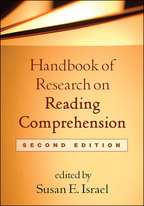Handbook of Research on Reading Comprehension
Second Edition
Edited by Susan E. Israel
Foreword by Gerald G. Duffy
1. Introduction: The Consequential Pulse of Reading Comprehension Research, Susan E. Israel and D. Ray Reutzel
2. The Roots of Reading Comprehension Instruction, P. David Pearson & Gina N. Cervetti
3. Comprehension Is Not Simple: Considering the Persisting Dangers in the Simple View of Reading Comprehension, James V. Hoffman
4. Professional Learning for Educators Focused on Reading Comprehension: A Historical Perspective, Barbara Laster & Carla Finkelstein
5. Research on Helping Readers Make Sense of Print: Evolution of Comprehension-Based Pedagogy, Kenneth S. Goodman, Yetta M. Goodman, & Kelly L. Allen
II. Theoretical Perspectives
6. An Evolving Perspective of Constructively Responsive Reading Comprehension Strategies in Multilayered Digital Text Environments, Byeong-Young Cho & Peter Afflerbach
7. Toward a Theory of Literacy Meaning Making within Virtual Worlds, Richard Beach and Robert J. Tierney
8. Meaning Making in the 21st Century: The Sociogenesis of Reading Comprehension, James Gavelek & Colleen E. Whittingham
9. Literacy, Comprehension, and the Neurosciences, George G. Hruby
III. Diagnosis, Assessment, and Intervention
10. Assessments of Reading Comprehension: Challenges and Directions, Lauren Leslie and JoAnne Schudt Caldwell
11. Using Assessments to Map and Evaluate the Comprehension Development of Young Children, Katherine A. Dougherty Stahl & Georgia Earnest García
12. Comprehension Difficulties and Struggling Readers, Richard L. Allington & Anne McGill-Franzen
13. Self-Regulation and Reading Comprehension: Moving Beyond the Individual's Cognition in Regulated Learning, Dixie D. Massey & Samuel D. Miller
14. Reconsidering Fluency's Role in Reading Comprehension, Melanie Kuhn & Paula J. Schwanenflugel
IV. Impact of Text and Higher-Order Processing
15. Text and Comprehension: A Retrospective, Perspective, and Prospective, Emily Fox & Patricia A. Alexander
16. Reading Comprehension in the Middle Grades: Characteristics, Challenges, and Effective Supports, Ruth Wharton-McDonald & Joy Erickson
17. Vocabulary and Reading Comprehension: The Nexus of Meaning, Gwynne Ellen Ash & James F. Baumann
18. Improving Adolescent Comprehension: Developing Strategies in the Content Areas, Mark W. Conley
19. Structure, Epistemology, and Metalanguage Foundations of Reading Comprehension in Scientific Texts, Linda M. Phillips & Anat Yarden
20. Graphic Text and Visual Literacies in Reading Comprehension, Stergios Botzakis, Jason D. DeHart, & Sean P. Connors
V. Diverse Components and Engagement
21. Reading Comprehension Research and the Shift Toward Culturally Sustaining Pedagogy, Colleen M. Fairbanks, Jewell E. Cooper, Sandra M. Webb, & Lynn A. Masterson
22. Comprehension in the Disciplines, Cynthia Shanahan
23. Constructing Meaning through Discussion, Keli Garas-York & Janice F. Almasi
24. The Role of Interest in Reading Comprehension, Sheree E. Springer, Janice A. Dole, & Douglas J. Hacker
25. Comprehension Strategies Instruction for Learners of English: Where We Have Been, Where We Are Now, Where We Still Might Go, Rachel Brown
26. Family Literacy Initiatives and Reading Comprehension, Patricia A. Edwards, Maria Selena Protacio, Marliese Peltier, & Laura Hopkins
VI. Future Directions
27. The Role of Literacy Coaching in Improving Comprehension Instruction, Misty Sailors, Sylvia Minton, & Lorena Villarreal
28. Public Policy in an Era of Changing Literacies: A Focus on Reading Comprehension, Lori Helman & Cory Stai
29. Sophistication of Reading Comprehension: Where to from Here?, Susan E. Israel



